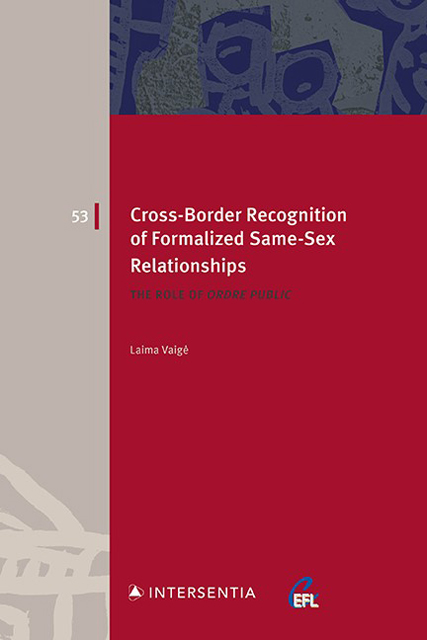Book contents
- Frontmatter
- Preface
- Contents
- List of Abbreviations
- Special Terminology
- List of Legislation and Other Instruments
- List of Cases
- Part I Setting the Stage
- Part II The Ordre Public in the Baltic States and Poland
- Part III The European and the EU Ordre Public
- Part IV Legal Effects of Formalized Same-Sex Relationships: National and Supranational Law
- Part V Law in Context
- Bibliography
- Index
- About the Author
- European Family Law Series
Chapter 8 - International Treaties on Cross-Border Recognition of Marriages and Partnerships
Published online by Cambridge University Press: 20 April 2023
- Frontmatter
- Preface
- Contents
- List of Abbreviations
- Special Terminology
- List of Legislation and Other Instruments
- List of Cases
- Part I Setting the Stage
- Part II The Ordre Public in the Baltic States and Poland
- Part III The European and the EU Ordre Public
- Part IV Legal Effects of Formalized Same-Sex Relationships: National and Supranational Law
- Part V Law in Context
- Bibliography
- Index
- About the Author
- European Family Law Series
Summary
Introduction
This chapter is structured as follows: First, the importance of treaties on the issue of cross-border recognition of marriages and registered partnerships is explained ( section 8.2 ). The old Hague Conventions are not directly relevant to same-sex marriages in the Baltic States and Poland. They should be mentioned, however, as a valuable example of supranational choice-of-law rules and due to the fact that some Member States did not denounce the said Conventions. More than a hundred years ago, these Conventions were agreed upon and ratified by many European States, hence they are discussed in section 8.3. The next section focuses on the treaties on cross-border recognition of marriages and registered partnerships ( section 8.4 ). These treaties are most the specific sources of law as to cross-border recognition of formalized family status, besides the national provisions. The States analysed in this book have not participated in these treaties. The treaties analysed in section 8.4 are a valuable source of inspiration for the EU legislator. In section 8.5, the treaties which are relevant to effects of marriage are discussed. An overview of other important global sources is presented in section 8.6. The chapter ends with concluding remarks on the impact of treaties and their prospects for the future ( section 8.7 ).
The Importance of Treaties on Crossborder Recognition of Civil Status
Treaties as Useful Examples
The Hague Conference on Private International Law (HCCH) is a global organization that unites 84 States worldwide and, additionally, the European Union. Its aim is “is to work for the progressive unification of the rules of private international law”. The International Commission on Civil Status (ICCS) is an international organization that, until recently, worked on a European level. It was founded in 1948 and focused on international harmonization of legal rules related to civil status. The International Commission on Civil Status also produced a number of Conventions, most of which were of a technical nature. With the expanded EU competence in the area of cross-border movement of civil status documents, EU Member States have gradually ceased their membership of the ICCS.
- Type
- Chapter
- Information
- Cross-Border Recognition of Formalized Same-Sex RelationshipsThe Role of <i>Ordre Public</i>, pp. 283 - 298Publisher: IntersentiaPrint publication year: 2022

